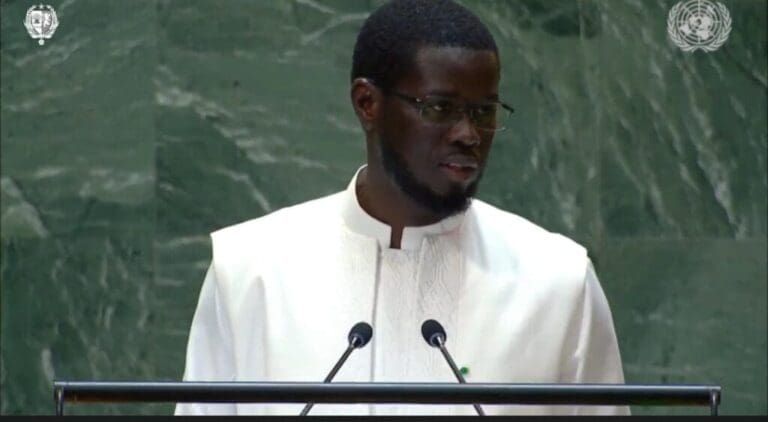Senegalese President Bassirou Diomaye Faye has raised a series of key
points concerning current global issues, calling for a transformation
of international institutions and addressing topics such as the Sahel,
economic inequality and the climate crisis.
Addressing the 79th session of the United Nations General Assembly on Wednesday, September 25, President Faye reaffirmed Senegal’s commitment to peace and global justice.
Delivering his first speech at the United Nations podium, Faye welcomed the commitment of UN Secretary-General António Guterres and emphasized the need to revitalize multilateralism, which he believes remains the only way to guarantee international peace and security.
The Senegalese President recalled that “unity in diversity is the key to ensuring sustainable development and human dignity for all.” He also denounced the questioning of multilateralism in the current context, stating that “the world must look itself in the face, without complacency.”
The tragedy of the Sahel
In his speech, the Senegalese Head of State expressed deep concern about the degrading situation in the Sahel, deploring the terrorist violence that continues to ravage the region. “We no longer want to turn a blind eye to the tragedy unfolding in the Sahel,” he said, criticizing the inaction of the international community, particularly the Security Council.
According to him, this once stable region has become a hotbed of violence, exacerbated by rivalries between foreign powers, referring to Ukraine’s admissions of support for the Malian rebellion. “Africa’s peace and security are inseparable from world peace,” he insisted.
Senegal’s unwavering commitment to the Palestinian cause
Addressing the Israeli-Palestinian conflict, Faye reiterated Senegal’s historic commitment to the rights of the Palestinian people.
In his capacity as Chair of the Committee on the Exercise of the Inalienable Rights of the Palestinian People, he called for an immediate ceasefire and supported the two-state solution. “Entire generations have grown up there under the shadow of oppression,” he said, calling on the international community to act swiftly to re-establish international humanitarian law in the region.
For equitable global governance
The Senegalese President also spoke out on global economic inequalities, deploring the fact that countries in the South particularly in Africa, are heavily penalized by practices such as tax evasion and illicit financial flows. “These injustices must be
corrected to allow all countries to participate fully in global trade,” he argued.
He also advocated for urgent reform of international institutions such as the Security Council, the IMF and the World Bank, in order to better reflect current geopolitical realities.
Climate emergency and differentiated responsibilities
On the environmental front, Faye recalled that industrialized countries, historically responsible for global warming, must step up their efforts to finance a “fair and equitable energy transition” that does not penalize developing countries. He stressed the importance of protecting the planet while ensuring that the development of the most vulnerable nations is not sacrificed.
Respect for cultures and diversity of civilizations
In a call for respect for cultural and civilizational differences, the Senegalese President recalled that “since its independence, Senegal has always defended the equal dignity of cultures and civilizations”.
He insisted that no nation should impose its practices as a universal norm, stressing that “respect for differences is the foundation of stability and peace in the world”.
International solidarity and collective action
Finally, Faye reaffirmed Senegal’s determination to commit to sustainable development and called for collective action. “No country, however, powerful, can address the challenges that threaten humanity alone,” he recalled, before calling for “acting together, united in diversity, to build a future where human dignity is respected, justice prevails and prosperity is shared.”
With these main points, the Senegalese president stressed the importance of global solidarity in the face of current crises and the need to reform international institutions for a more equitable future.
AC/Sf/fss/GIK/APA


